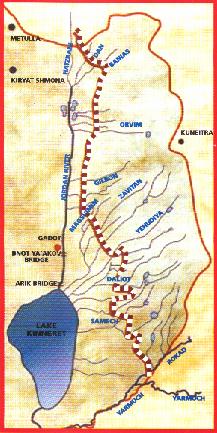With Syria, trade peace for peace
Jan Willem van der Hoeven
The Golan Heights, or Bashan as it is called in the Bible, was part of the Promised Land Joshua allotted to the Israelite tribe of Manasseh. Israel should never squander it again. |
|||||||
|
|||||||
With Syria, trade peace for peace
Jan Willem van der Hoeven
The Golan Heights, or Bashan as it is called in the Bible, was part of the Promised Land Joshua allotted to the Israelite tribe of Manasseh. Israel should never squander it again. |
|||||||
|
|||||||
.
| . | Who Says the Golan Is Syrian?
By Prof. Yoav Gelber [Originally appeared in
Yediot Ahronot, translation thanks to Moshe Kohn] |
. |  |
. | |||
| The response of Israel's foreign
minister at that time, Moshe Sharett, was that it was unthinkable that Israel
should hand her Syrian enemy what the British had refused to give their French
ally. Under the 1949 armistice, the Syrian Army retreated across the border, and the area they vacated was declared a demilitarized zone. The struggle for the control of that area reached its peak when Israel started to drain the Huleh Valley swampland. In the spring of 1951 violence broke out throughout the demilitarized zone, leading to the expulsion of the Arab residents of the area to Galilee and across the border, and Israeli sovereignty over the area was ensured. There was a de facto partition of the demilitarized areas: Israel controlled the central section and the Syrians had el-Hamma on the Kinneret's northeastern shore and two tels on the fringes of the Galilee "panhandle." This partition is the basis of the difference between the two concepts, "the international border" and "the June 4 [1967] lines." What did not obligate the Syrians then should not obligate Israel [today]. There is no need today to hand the Syrians a border that they rejected in the1940s and 1950s. The Golan has been under Israeli rule longer than under the rule of independent Syria (36 years as against 21 years). [The Golan town of] Katzrin is no more Syrian than Jaffa, Lod, Ramleh, or Acco [Acre] are Palestinian (under the 1947 United Nations partition proposal), and we ought to think of the consequences of setting a precedent by giving up the Golan. The weight of the historical arguments might have been different if Syria held Israel by the throat. But the only real Syrian threat against Israel is the threat of missiles aimed at Israel's center. Security arrangements in the Golan might be a partial solution regarding the security of the Israeli settlements situated along the pre-1967 line, but is no answer to the threat of missiles fired from points far from the demilitarized zone and from far Israel's warning systems. The sole constraint on the implementation of this threat is the Israel Defense Forces ' proximity to Damascus, Israel's withdrawal from which would abandon the Dan region, the Coastal Plain, and Haifa to Syrian missiles. The argument that a peace agreement is the best defense against missiles is delusive. There has never been a war that was not receded by peace. And the risks of war in our case are not symmetrical: we cannot afford a single loss, whereas our neighbors have survived several debacles. That is why Israel stubbornly insists on security arrangements in any pace pact with any of her neighbors. Syria has far more serious problems than we in the military sphere, in the economic sphere, and in the political sphere. She needs peace in order to solve some of them, and it is she - not Israel - that has to pay the main part of the price to achieve it: first and foremost by ceasing to support Palestinian and Lebanese terror, and also by waiving her claim to most of the Golan. |
|||||||
|
|||||||